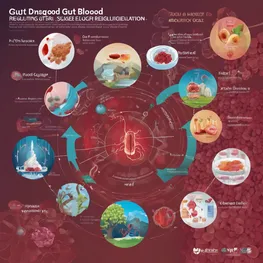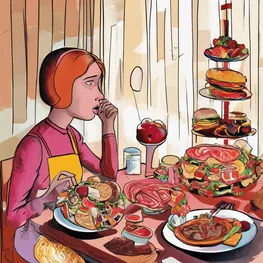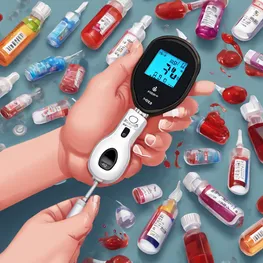Table of contents
- Unraveling the Mystery of Food Cravings and Their Effects on Blood Sugar
- The Influence of Stress and Emotions on Food Cravings and Blood Sugar Regulation
- Discover the Secret to Managing Blood Sugar Levels and Beating Food Cravings with Healthy Eating
- Rebalance Your Body: Lifestyle Modifications for Blood Sugar Stability and Cravings Management
- The ultimate guide to successful blood sugar management
- Satisfy your sweet tooth with these healthy and delicious recipes
In this article, we delve into the fascinating world of food cravings and their connection to blood sugar levels. Understanding the psychology behind these cravings can shed light on why we reach for certain foods and how they impact our overall health. Join us as we explore the intricate relationship between our minds, bodies, and the foods we desire.
Unraveling the Mystery of Food Cravings and Their Effects on Blood Sugar
Food cravings can be a puzzling phenomenon, often influencing our food choices and even our blood sugar levels. Understanding the psychological factors that contribute to these cravings is key to unraveling this mystery. Let's explore some of the factors that play a role in fueling our food cravings:
- Emotional factors: Emotions such as stress, boredom, and sadness can trigger food cravings. Many people turn to comfort foods to cope with these emotions, seeking solace and temporary relief in familiar flavors and textures.
- Social factors: Our social environment can heavily influence what foods we crave. Watching others eat certain foods or being in social situations where specific foods are readily available can create a desire for those items.
- Conditioning and associations: Cravings can also be driven by our past experiences and associations. If we have frequently paired a certain food with pleasure or reward, our brain may start to crave that food when it wants to experience those positive feelings again.
- Habitual factors: Everyday habits and routines play a significant role in food cravings. For instance, if we have a habit of having a sugary snack before bed, our body may crave it at that specific time due to the established routine.
- Nutritional deficiencies: Sometimes, cravings can arise from nutrient imbalances or deficiencies in our body. Our cravings may be our body's way of signaling that it needs certain nutrients.
- Advertising and media: The constant exposure to food advertisements and enticing food images in the media can also contribute to our food cravings. These images can create a strong desire for specific foods, even when we are not necessarily hungry.
The Influence of Stress and Emotions on Food Cravings and Blood Sugar Regulation
Stress and emotional states significantly impact food cravings and can disrupt blood sugar regulation. Studies have shown that stress promotes the release of cortisol, which can lead to increased appetite and cravings for high-calorie foods. Emotional states like sadness or boredom can also trigger food cravings as a means of seeking comfort or distraction. Additionally, stress and emotions can affect blood sugar regulation by altering insulin sensitivity and promoting unhealthy eating behaviors. Understanding the connection between stress, emotional states, and food cravings is crucial for managing overall health and promoting mindful eating habits.
Discover the Secret to Managing Blood Sugar Levels and Beating Food Cravings with Healthy Eating
Are you tired of constantly dealing with fluctuating blood sugar levels and uncontrollable food cravings? Look no further! Here, we will explore the secrets behind balanced and sustainable meal plans that can help you maintain stable blood sugar levels and beat those pesky cravings.
-
Understanding Blood Sugar Levels
Learn about the importance of stable blood sugar levels and how they contribute to overall health and well-being.
-
Balanced Meal Planning
Discover the key components of a balanced meal plan that includes the right balance of carbohydrates, proteins, and fats to keep blood sugar levels in check.
-
Glycemic Index and Load
Uncover the role of glycemic index and load in managing blood sugar levels and how to incorporate low glycemic foods into your diet.
-
Choosing the Right Carbohydrates
Get insights into selecting carbohydrates that are high in fiber and have a slower impact on blood sugar, such as whole grains, fruits, and vegetables.
-
Importance of Protein and Healthy Fats
Understand how protein and healthy fats contribute to stable blood sugar levels and learn about the best sources to include in your meal plan.
-
Portion Control and Timing
Learn the importance of portion control and timing in managing blood sugar levels, and gain practical tips for incorporating them into your daily routine.
-
Sustainable and Enjoyable Meal Ideas
Explore delicious and satisfying meal ideas that are both balanced and sustainable, making it easier to stick to a blood sugar-friendly eating plan.
-
Lifestyle Factors
Discover the impact of lifestyle factors like regular physical activity, stress management, and adequate sleep on blood sugar control.
Rebalance Your Body: Lifestyle Modifications for Blood Sugar Stability and Cravings Management
Physical activity plays a crucial role in blood sugar management and overall well-being. Understanding the importance of staying active can significantly impact your ability to maintain stable blood sugar levels and effectively manage cravings.
- Regular physical activity helps to increase insulin sensitivity, allowing your body to use glucose more efficiently. This can help regulate blood sugar levels and prevent spikes and dips.
- Engaging in exercise helps to promote weight loss or weight maintenance, which is important for blood sugar control. Excess weight can contribute to insulin resistance, making it more challenging to manage blood sugar levels.
- Physical activity can reduce stress levels, which can also have a positive impact on blood sugar management. Stress hormones can increase blood sugar levels, so finding ways to reduce stress through exercise can be beneficial.
- Exercise can improve cardiovascular health, reducing the risk of complications associated with diabetes. It can help lower blood pressure, manage cholesterol levels, and maintain overall heart health.
- Regular physical activity can also improve energy levels, promote better sleep, and enhance mental well-being, all of which contribute to better blood sugar management.
- It is important to find physical activities that you enjoy and can maintain long-term. This will help ensure that you stick to your exercise routine and continue reaping the benefits of regular physical activity.
The ultimate guide to successful blood sugar management
Getting insights from healthcare professionals is essential for effectively managing blood sugar levels. Their expertise and guidance can provide valuable information on diet, exercise, medication, and lifestyle changes that can help control and stabilize blood sugar levels for better overall health.
Satisfy your sweet tooth with these healthy and delicious recipes
If you're looking to satisfy your sweet tooth while still maintaining a healthy lifestyle, you've come to the right place! Explore this collection of satisfying and nutritious recipes that will not only curb your food cravings but also provide you with the essential nutrients your body needs.
- Indulge in guilt-free desserts that are both delicious and nourishing. From fruity smoothie bowls to protein-packed energy balls, these recipes offer a variety of options to satisfy your sweet cravings without any added sugars or unhealthy fats.
- Discover creative ways to incorporate fruits into your desserts. From baked apples with cinnamon to chocolate-dipped strawberries, these recipes are not only tasty but also packed with vitamins, minerals, and fiber to keep you feeling full and satisfied.
- Try out some healthier versions of classic favorites. Whether you're craving chocolate chip cookies or creamy ice cream, there are plenty of recipes available that use wholesome ingredients like oats, almond flour, and natural sweeteners to create nutritious alternatives.
- Experiment with homemade snacks that will keep you energized throughout the day. From granola bars to chia seed pudding, these recipes are not only convenient but also filled with nutrients that will help keep your cravings at bay and support your overall well-being.
- Learn about the benefits of incorporating nutritious ingredients like nuts, seeds, and dark chocolate into your desserts. These recipes will not only provide you with a satisfying taste but also offer essential nutrients like healthy fats, antioxidants, and protein.
In conclusion, our cravings for certain foods may be linked to fluctuations in blood sugar levels. The consumption of high glycemic index foods can lead to rapid spikes and subsequent crashes in blood sugar, which in turn trigger cravings for more of these foods. Understanding the psychology behind food cravings and blood sugar regulation can help individuals make healthier dietary choices and maintain stable blood sugar levels, promoting overall physical and mental well-being. By opting for a balanced diet consisting of whole, nutrient-dense foods, we can better manage our blood sugar levels and reduce the occurrence of food cravings.
Frequently asked questions related to psychology of food cravings
What causes food cravings?
Food cravings can be caused by a variety of factors, including hormonal imbalances, emotional and psychological factors, and nutrient deficiencies. When blood sugar levels drop, the body may crave high-sugar or high-fat foods to provide quick energy.
Can stress and emotions contribute to food cravings?
Yes, stress and emotions can contribute to food cravings. When we are stressed or experiencing negative emotions, our bodies produce higher levels of cortisol, also known as the stress hormone. Cortisol can increase appetite and trigger cravings for unhealthy foods, particularly those high in sugar, fat, and salt.
Can blood sugar levels be regulated to reduce food cravings?
Yes, maintaining stable blood sugar levels can help reduce food cravings. To regulate blood sugar, focus on consuming balanced meals and snacks that include a combination of protein, healthy fats, and complex carbohydrates. Avoid consuming excessive amounts of refined sugars and processed foods, as they can cause blood sugar spikes and crashes.
How does blood sugar affect food cravings?
When blood sugar levels are low, the body craves sugary and high-carbohydrate foods as a quick source of energy. These foods cause a rapid increase in blood sugar levels, providing a temporary boost of energy. However, this spike is followed by a crash, which leads to further cravings.
How can I manage food cravings?
There are several strategies you can try to manage food cravings. First, ensure you're eating a balanced diet that includes a variety of nutrient-dense foods. This will help prevent nutrient deficiencies that can trigger cravings. Second, practice stress-management techniques such as meditation or exercise to reduce the likelihood of stress-induced cravings. Lastly, try incorporating healthier alternatives into your diet, such as swapping sugary snacks for fruits or opting for whole grain carbohydrates instead of processed ones.
Are food cravings related to nutrient deficiencies?
Yes, food cravings can be related to nutrient deficiencies. For example, cravings for chocolate may indicate a magnesium deficiency, while cravings for red meat may indicate an iron deficiency. It's important to pay attention to these cravings and consult with a healthcare professional if you suspect a nutrient deficiency.







